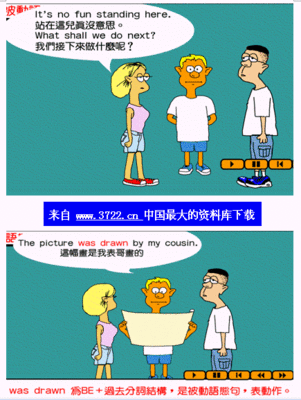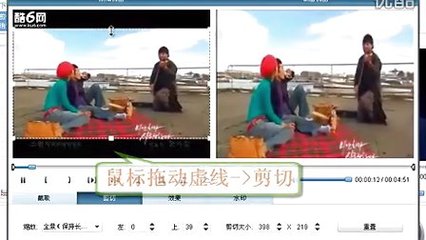被动语态的使用
1.当不知道或没有必要指出动作的执行者时,常用被动语态,这时往往不用by短语。
“Mr. White, the cupwith mixture was broken after class. ”
(只是告诉老师杯子坏了,不知是谁弄坏的,或不想说出谁弄坏的)。
2.突出或强调动作的承受者,如果需要说出动作的执行者,用by短语。
These records weremade by John Denver. The cup was broken byPaul.
3.当汉语句子的主语既不是动作的执行者,也不是动作的承受者时,这时常用in +名词作状语,而代替 by 短语。
These cars were madein China. 15,000 cars will be produced each year in the newfactory.
语态转换时要注意的问题
1. 含有双宾语的主动句变被动句时,可分别将其中的一个宾语变为主语,另一个不动,一般变间接宾语为主语时比较多。
My uncle gave me apresent on my birthday./I was given a present on mybirthday.
如果把直接宾语(指物)改为主语,则在间接宾语(指人)前加适当的介词,如上句还可以说:A present was givento me yesterday.
注意:一般在下列动词后,常在间接宾语前用介词 to,如:bring, give, hand,lend, offer, pass, pay, promise, sell, show, take, teach,tell 等。
The cup with mixture was showed to the class. My bike was lent toher.
一般在下列动词后,间接宾语前用介词 for,如: build, buy, cook, cut, choose, do, fetch, find,fix, get, keep, make, order, paint, play, sing等。
Mother made me a new skirt. (A new skirt was madefor me.)he meat was cooked for us. Some country musicwas played for us.
有些既不用to 也不用for, 根据动词与介词的搭配关系。 He asked me aquestion.(A question was asked of me. ) People all over theworld know the Great Wall.
The Great Wall isknown to people all over the world. (不用by短语)
2. 由动词+ 介词或副词构成的短语动词,把它们看成一个及物动词,介词或副词不可拆开或漏掉。这类动词有:
不及物动词+ 介词,如: agree to, ask for, laugh at, operated on,listen to, look after, think of, talk about等。
The patient is beingoperated on. The problem issolved. It needn't be talked about.
及物动词+ 副词:如:bring about, carry out, find out, give up, handin, make out, pass on, point out, put away, put off, think over,turn down, work out, turn out 等。
His request wasturned down. The sports meet willbe put off because of the bad weather.
3. 带复合宾语(宾语+宾补)的动词改为被动语态时,一般把主动结构中的宾语改为主语,而宾语补足语保留在谓语动词后面。如:
We always keep the classroom clean.→The classroom is always kept clean.
She told us to follow her instructions.→We were told to follow herinstructions.
注意:在see, watch, hear, notice, listen to, look at,make, feel等动词后作宾语补足语的动词不定式都不带to,但改成被动语态后都带to,这时不定式为主语补足语,也就是说不定式作主语补足语不存在省略to的问题。
We often hear him play the guitar. →He is often heard to play the guitar.
注意:带有复合宾语的句子,如果宾语补足语是名词,变被动句时,应将宾语变为主语,不要误把宾语补足语的名词作主语。如:
Tomatoes were first taken back to Europe and people called themlove apples.
误:Love apples were called them.正:They were called love apples.
4.还有一种短语动词由动词+ 名词+ 介词构成,变被动语态有两种形式,如下:
1) We take good care of thebooks.
The books are taken good care of.
Good care is taken of the book.
2) You must pay attention toyour pronunciation.
Attention must be paid to your pronunciation.
Your pronunciation must be paid attention to.

用于这类结构的短语动词常见的有:catch sight of, make use of,pay attention to, set fire to, take care of, take hold of, takenotice of, keep an eye on 等。
5.当主动句的主语是nobody, noone等含有否定意义的不定代词时,被动句中将其变为anybody, 作by的宾语,并将谓语动词变为否定的被动语态。如:
Nobody can answer this questi on.
误:The question can be answeredby nobody.正:The question can not beanswered by anybody.
6.当否定句中的宾语是anything, anybody,anyone等不定代词时,在被动句中应将其分别变为nothing,nobody, no one作主语,并将谓语动词变为肯定的被动语态。如:
They haven't done anything to make the river clean.
误:Anything hasn't been done tomake the river clean.
正:Nothing has been done to makethe river clean.
7.以who为主语开头的疑问句,变被动时,用bywhom放在句首:
Who wrote thestory?
误:Who was the story written?
正:By whom was the story written?
8.(主动形式表示被动)有些动词既是及物又是不及物,当它们和well, badly,easily等副词连用时,表示主语内在品质或性能,是不及物动词,用主动表示被动,这时不用被动语态,常见的有:write, read, clean,sell, wash, cook 等。如:
The cloth washeseasily.这布很好洗。 The new product sells well.这新产品很畅销。
The pen writessmoothly.这支笔写字很流畅。
对比:
The books sell well.(主动句) The books were soldout. (被动句)The meatdidn’t cook well.(主动句) The meat was cookedfor a long time over low heat. (被动句)
9.下列情况主动句不能改为被动句:
第一,感官系动词一般用主动形式表示被动意义,如:feel,look, seem, taste,sound, remain等。
— Do you like the material?— Yes, it feels very soft.
误:It is felt very soft.
The food tastesdelicious.
误:The food is tasted delicious.
The pop music soundsbeautiful.
误:The pop music is sounded beautiful.
第二,谓语是及物动词leave, enter, reach, suit, have, benefit, lack,own等。如:
He entered the roomand got his book.
误:The room was entered and his book wasgot.
She had her handburned.
误:Her hand was had burned.
第三,一些不及物动词短语没有被动语态,如:take place, break out, belongto, lose heart, consist of, add up to等。如:
The fire broke out inthe capital building.
误:The fire was broke out in the capitalbuilding.
第四,不及物动词没有被动语态,如:rise, happen, succeed, remain,lie等。
When we got to thetop of the mountain, the sun had already risen.
误:The sun had already been risen.
After the earthquake,few houses remained.
误:After the earthquake, few houses wereremained.
第五,宾语是反身代词,相互代词,同源宾语,不定式,v-ing形式及抽象名词等,不能变为被动句子的主语,如:
I taught myselfEnglish.
误:Myself was taught English.
We love eachother.
误:Each other is loved.
10.在汉语中,有一类句子不出现主语,在英语中一般可用被动结构来表示,例如:
据说……It is said that …
据报导……It is reported that …
据推测……It is supposed that …
希望……It is hoped that …
众所周知…… Itis well known that …
普遍认为…… Itis generally considered that …
有人建议…… Itis suggested that …
1) It is reportedthat it is going to rain tomorrow.
2) It is well knownthat Thomas Edison invented the electric lamp.
在英语语言中,被动语态是极常见的语言现象,人们进行语言交际,离不开对被动语态的使用,熟练掌握被动语态也为下一步学习打下良好的基础,在动词-ing形式,不定式等结构中,都有被动式,都需要运用被动语态的知识去理解。
 爱华网
爱华网



